隐私为什么重要
个人隐私在生活中的重要性论文
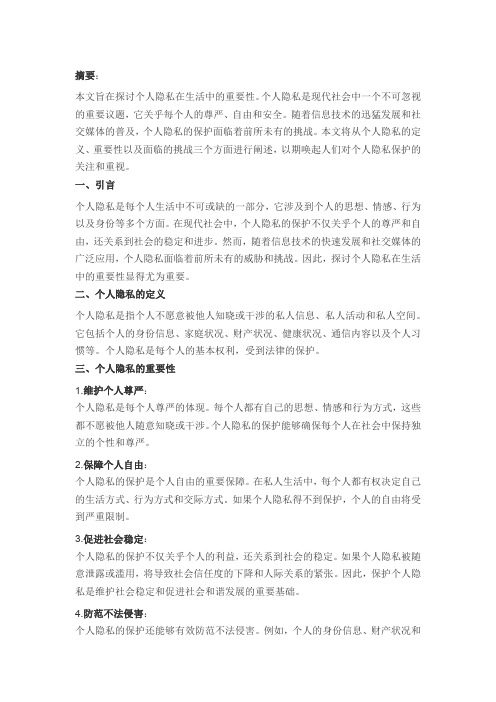
摘要:本文旨在探讨个人隐私在生活中的重要性。
个人隐私是现代社会中一个不可忽视的重要议题,它关乎每个人的尊严、自由和安全。
随着信息技术的迅猛发展和社交媒体的普及,个人隐私的保护面临着前所未有的挑战。
本文将从个人隐私的定义、重要性以及面临的挑战三个方面进行阐述,以期唤起人们对个人隐私保护的关注和重视。
一、引言个人隐私是每个人生活中不可或缺的一部分,它涉及到个人的思想、情感、行为以及身份等多个方面。
在现代社会中,个人隐私的保护不仅关乎个人的尊严和自由,还关系到社会的稳定和进步。
然而,随着信息技术的快速发展和社交媒体的广泛应用,个人隐私面临着前所未有的威胁和挑战。
因此,探讨个人隐私在生活中的重要性显得尤为重要。
二、个人隐私的定义个人隐私是指个人不愿意被他人知晓或干涉的私人信息、私人活动和私人空间。
它包括个人的身份信息、家庭状况、财产状况、健康状况、通信内容以及个人习惯等。
个人隐私是每个人的基本权利,受到法律的保护。
三、个人隐私的重要性1.维护个人尊严:个人隐私是每个人尊严的体现。
每个人都有自己的思想、情感和行为方式,这些都不愿被他人随意知晓或干涉。
个人隐私的保护能够确保每个人在社会中保持独立的个性和尊严。
2.保障个人自由:个人隐私的保护是个人自由的重要保障。
在私人生活中,每个人都有权决定自己的生活方式、行为方式和交际方式。
如果个人隐私得不到保护,个人的自由将受到严重限制。
3.促进社会稳定:个人隐私的保护不仅关乎个人的利益,还关系到社会的稳定。
如果个人隐私被随意泄露或滥用,将导致社会信任度的下降和人际关系的紧张。
因此,保护个人隐私是维护社会稳定和促进社会和谐发展的重要基础。
4.防范不法侵害:个人隐私的保护还能够有效防范不法侵害。
例如,个人的身份信息、财产状况和通信内容等敏感信息如果被泄露,可能引发身份盗用、财产诈骗和网络攻击等不法行为。
因此,保护个人隐私是防范不法侵害的重要手段。
四、个人隐私面临的挑战1.信息技术的快速发展:随着信息技术的快速发展,个人隐私面临着前所未有的威胁。
个人隐私信息保护的重要性为何
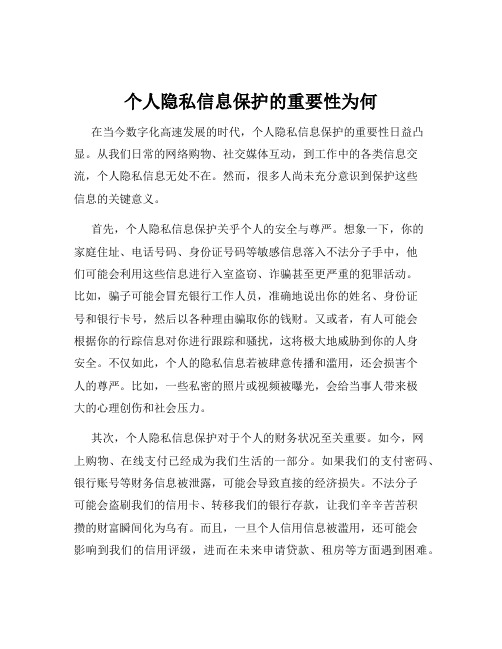
个人隐私信息保护的重要性为何在当今数字化高速发展的时代,个人隐私信息保护的重要性日益凸显。
从我们日常的网络购物、社交媒体互动,到工作中的各类信息交流,个人隐私信息无处不在。
然而,很多人尚未充分意识到保护这些信息的关键意义。
首先,个人隐私信息保护关乎个人的安全与尊严。
想象一下,你的家庭住址、电话号码、身份证号码等敏感信息落入不法分子手中,他们可能会利用这些信息进行入室盗窃、诈骗甚至更严重的犯罪活动。
比如,骗子可能会冒充银行工作人员,准确地说出你的姓名、身份证号和银行卡号,然后以各种理由骗取你的钱财。
又或者,有人可能会根据你的行踪信息对你进行跟踪和骚扰,这将极大地威胁到你的人身安全。
不仅如此,个人的隐私信息若被肆意传播和滥用,还会损害个人的尊严。
比如,一些私密的照片或视频被曝光,会给当事人带来极大的心理创伤和社会压力。
其次,个人隐私信息保护对于个人的财务状况至关重要。
如今,网上购物、在线支付已经成为我们生活的一部分。
如果我们的支付密码、银行账号等财务信息被泄露,可能会导致直接的经济损失。
不法分子可能会盗刷我们的信用卡、转移我们的银行存款,让我们辛辛苦苦积攒的财富瞬间化为乌有。
而且,一旦个人信用信息被滥用,还可能会影响到我们的信用评级,进而在未来申请贷款、租房等方面遇到困难。
再者,保护个人隐私信息有助于维护个人的社交关系和声誉。
在社交媒体盛行的今天,我们常常在上面分享自己的生活点滴。
但如果这些信息被不当利用,可能会引发误解和矛盾。
例如,你的聊天记录被曝光,其中一些无心之言被断章取义,可能会破坏你与朋友、家人之间的关系。
此外,如果个人的不良行为或错误被过度曝光,可能会在社会上造成不良影响,损害个人的声誉,影响到未来的职业发展和社会交往。
从社会层面来看,个人隐私信息保护是构建和谐社会的基础。
一个社会如果无法保障公民的隐私权利,人们将生活在恐惧和不安之中,信任关系也会受到严重破坏。
当每个人都担心自己的信息被泄露、被滥用时,社会的凝聚力和稳定性将受到冲击。
保护个人隐私的重要性
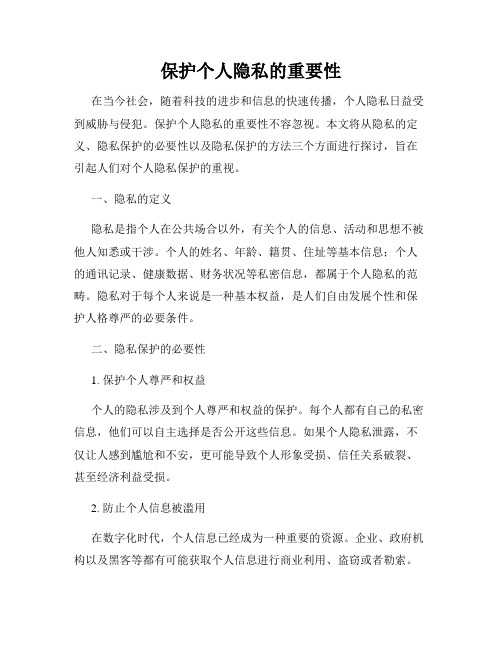
保护个人隐私的重要性在当今社会,随着科技的进步和信息的快速传播,个人隐私日益受到威胁与侵犯。
保护个人隐私的重要性不容忽视。
本文将从隐私的定义、隐私保护的必要性以及隐私保护的方法三个方面进行探讨,旨在引起人们对个人隐私保护的重视。
一、隐私的定义隐私是指个人在公共场合以外,有关个人的信息、活动和思想不被他人知悉或干涉。
个人的姓名、年龄、籍贯、住址等基本信息;个人的通讯记录、健康数据、财务状况等私密信息,都属于个人隐私的范畴。
隐私对于每个人来说是一种基本权益,是人们自由发展个性和保护人格尊严的必要条件。
二、隐私保护的必要性1. 保护个人尊严和权益个人的隐私涉及到个人尊严和权益的保护。
每个人都有自己的私密信息,他们可以自主选择是否公开这些信息。
如果个人隐私泄露,不仅让人感到尴尬和不安,更可能导致个人形象受损、信任关系破裂、甚至经济利益受损。
2. 防止个人信息被滥用在数字化时代,个人信息已经成为一种重要的资源。
企业、政府机构以及黑客等都有可能获取个人信息进行商业利用、盗窃或者勒索。
个人隐私保护的重要性在于防止个人信息被滥用,确保个人合法权益的受到保护。
3. 维护社会稳定和安全个人隐私泄露可能引发社会不稳定和安全问题。
例如,敏感个人信息可能被用于进行诈骗、谣言传播等不法活动,导致社会秩序混乱。
此外,政府机构、企业和组织泄露个人信息可能导致社会公众对其信任度下降,进而破坏社会和谐稳定。
三、隐私保护的方法1. 加强个人信息保护意识个人应该提高对隐私保护的意识,妥善管理个人信息。
例如,避免在公共场合随意透露个人隐私信息;合理设置账户密码,避免使用简单易破解的密码;警惕社交网络上的信息收集和利用等。
只有个人保持高度的隐私保护意识,才能更好地保护个人隐私。
2. 加强隐私保护法律法规建设各国家和地区应当制定完善的隐私保护法律法规,以规范个人隐私的使用和保护。
这些法律法规应明确个人隐私权的范围和保护措施,规定个人信息收集和使用的权限,建立个人信息保护机制等。
为什么个人隐私权的保护如此重要?

为什么个人隐私权的保护如此重要?1. 保护个人权利个人隐私权是每个人基本权利之一,其保护不仅仅是为了避免个人信息被泄露或滥用,更是为了保障个人权利。
一个人的隐私权受到侵犯,不仅会让个人感到不安和恐惧,还可能造成身心上的创伤。
大量的个人数据,例如健康状况、家庭住址、银行卡信息等,如果被不法分子盗取,会导致个人财产安全受到威胁,对个人生活和安全产生巨大影响。
2. 维护社会秩序保护个人隐私权也有利于维护社会秩序。
有些人会利用公共场合的监控摄像头或者社交媒体上的信息,来对个人进行非法跟踪或者攻击。
这种行为不仅有悖于社会正义和人道主义,而且容易危及到公众的安全与稳定。
因此,严格保护个人隐私权,不仅是一种对人类文明的尊重,也是社会进步和稳定的基石之一。
3. 保护商业机密在商业企业中,个人隐私权的保护显得尤为重要。
一些公司采集了大量客户的个人信息,用于营销和促销活动,未经允许公开这些信息,不仅是对客户权利的侵犯,更是违反商业道德和行业规范。
严格保护个人隐私权,能够有效地防范商业机密的泄露,使企业获得更高的声誉和更大的市场优势。
4. 公共利益政府部门、医院、银行等公共机构收集和使用大量个人信息,这些信息涉及到公民个人的生命安全、社会治安等公共利益。
为了避免这些信息被滥用、泄露或盗窃,严格保护个人隐私权已成为一项必要的措施。
而政府部门也应该遵循相关的法律规定,明确规定隐私权保护的责任申明、隐私保护制度、相关处罚标准和赔偿标准等,以更有效地保障公众的利益和权益。
总之,个人隐私权的保护对于促进社会进步和维护社会稳定至关重要。
合理的措施和制度可以有效的减少隐私泄露和滥用,保护每个人的基本权利。
要加强法律法规建设与实施,提高公众的安全意识和保密意识,共同护卫个人隐私权和公共利益。
个人隐私权与公共安全,哪个更重要?(辩论辩题)
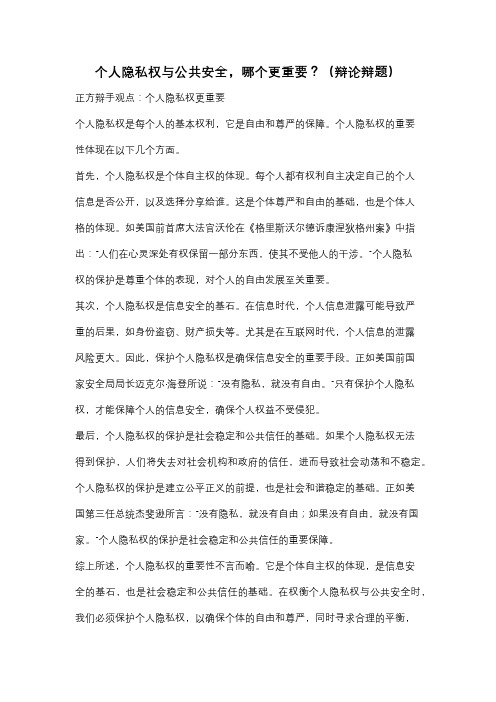
个人隐私权与公共安全,哪个更重要?(辩论辩题)正方辩手观点:个人隐私权更重要个人隐私权是每个人的基本权利,它是自由和尊严的保障。
个人隐私权的重要性体现在以下几个方面。
首先,个人隐私权是个体自主权的体现。
每个人都有权利自主决定自己的个人信息是否公开,以及选择分享给谁。
这是个体尊严和自由的基础,也是个体人格的体现。
如美国前首席大法官沃伦在《格里斯沃尔德诉康涅狄格州案》中指出:“人们在心灵深处有权保留一部分东西,使其不受他人的干涉。
”个人隐私权的保护是尊重个体的表现,对个人的自由发展至关重要。
其次,个人隐私权是信息安全的基石。
在信息时代,个人信息泄露可能导致严重的后果,如身份盗窃、财产损失等。
尤其是在互联网时代,个人信息的泄露风险更大。
因此,保护个人隐私权是确保信息安全的重要手段。
正如美国前国家安全局局长迈克尔·海登所说:“没有隐私,就没有自由。
”只有保护个人隐私权,才能保障个人的信息安全,确保个人权益不受侵犯。
最后,个人隐私权的保护是社会稳定和公共信任的基础。
如果个人隐私权无法得到保护,人们将失去对社会机构和政府的信任,进而导致社会动荡和不稳定。
个人隐私权的保护是建立公平正义的前提,也是社会和谐稳定的基础。
正如美国第三任总统杰斐逊所言:“没有隐私,就没有自由;如果没有自由,就没有国家。
”个人隐私权的保护是社会稳定和公共信任的重要保障。
综上所述,个人隐私权的重要性不言而喻。
它是个体自主权的体现,是信息安全的基石,也是社会稳定和公共信任的基础。
在权衡个人隐私权与公共安全时,我们必须保护个人隐私权,以确保个体的自由和尊严,同时寻求合理的平衡,以保障公共安全的需要。
反方辩手观点:公共安全更重要公共安全是维护社会秩序和保护人民生命财产安全的重要任务。
在一些特定情况下,为了公共安全的需要,个人隐私权可能需要进行一定的限制。
公共安全的重要性体现在以下几个方面。
首先,公共安全是国家的责任。
政府有责任保障国家的安全和人民的生命财产安全。
数据隐私保护的意义及重要性
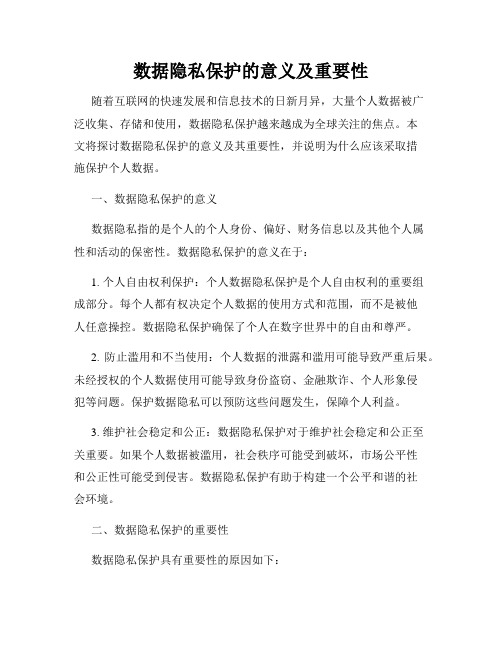
数据隐私保护的意义及重要性随着互联网的快速发展和信息技术的日新月异,大量个人数据被广泛收集、存储和使用,数据隐私保护越来越成为全球关注的焦点。
本文将探讨数据隐私保护的意义及其重要性,并说明为什么应该采取措施保护个人数据。
一、数据隐私保护的意义数据隐私指的是个人的个人身份、偏好、财务信息以及其他个人属性和活动的保密性。
数据隐私保护的意义在于:1. 个人自由权利保护:个人数据隐私保护是个人自由权利的重要组成部分。
每个人都有权决定个人数据的使用方式和范围,而不是被他人任意操控。
数据隐私保护确保了个人在数字世界中的自由和尊严。
2. 防止滥用和不当使用:个人数据的泄露和滥用可能导致严重后果。
未经授权的个人数据使用可能导致身份盗窃、金融欺诈、个人形象侵犯等问题。
保护数据隐私可以预防这些问题发生,保障个人利益。
3. 维护社会稳定和公正:数据隐私保护对于维护社会稳定和公正至关重要。
如果个人数据被滥用,社会秩序可能受到破坏,市场公平性和公正性可能受到侵害。
数据隐私保护有助于构建一个公平和谐的社会环境。
二、数据隐私保护的重要性数据隐私保护具有重要性的原因如下:1. 保护个人权利和尊严:数据隐私保护是确保每个人的个人权利和尊严得以尊重的重要手段。
个人数据的泄露可能导致隐私侵犯,影响个人自由和尊严。
数据隐私保护确保了个人对自己个人数据的掌控权。
2. 促进创新和经济发展:数据是当今社会最宝贵的资源之一,对数据的保护有助于建立一个可信赖的信息环境,促进创新和经济发展。
只有在个人数据得到有效保护的前提下,人们才会放心地参与数据经济,并充分发挥个人数据的潜力。
3. 构建信任和保障安全:数据隐私保护有助于构建一个可信赖的数字环境。
人们只有相信他们的个人数据得到保护,才会愿意分享更多的个人信息和数据。
数据隐私保护还可以提供网络安全的基础,防范网络犯罪和黑客攻击。
三、保护个人数据隐私的措施为了保护个人数据的隐私,以下是一些常见的措施:1. 加强法律法规:政府应加强数据隐私保护相关的法律法规,并建立健全的监管机制。
个人隐私保护的重要性你了解吗
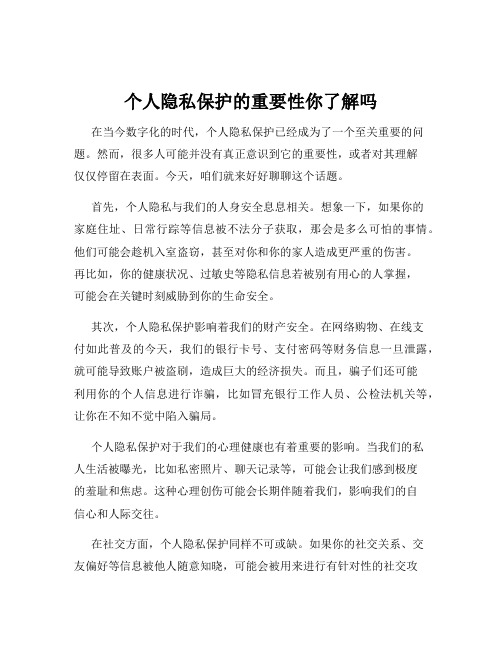
个人隐私保护的重要性你了解吗在当今数字化的时代,个人隐私保护已经成为了一个至关重要的问题。
然而,很多人可能并没有真正意识到它的重要性,或者对其理解仅仅停留在表面。
今天,咱们就来好好聊聊这个话题。
首先,个人隐私与我们的人身安全息息相关。
想象一下,如果你的家庭住址、日常行踪等信息被不法分子获取,那会是多么可怕的事情。
他们可能会趁机入室盗窃,甚至对你和你的家人造成更严重的伤害。
再比如,你的健康状况、过敏史等隐私信息若被别有用心的人掌握,可能会在关键时刻威胁到你的生命安全。
其次,个人隐私保护影响着我们的财产安全。
在网络购物、在线支付如此普及的今天,我们的银行卡号、支付密码等财务信息一旦泄露,就可能导致账户被盗刷,造成巨大的经济损失。
而且,骗子们还可能利用你的个人信息进行诈骗,比如冒充银行工作人员、公检法机关等,让你在不知不觉中陷入骗局。
个人隐私保护对于我们的心理健康也有着重要的影响。
当我们的私人生活被曝光,比如私密照片、聊天记录等,可能会让我们感到极度的羞耻和焦虑。
这种心理创伤可能会长期伴随着我们,影响我们的自信心和人际交往。
在社交方面,个人隐私保护同样不可或缺。
如果你的社交关系、交友偏好等信息被他人随意知晓,可能会被用来进行有针对性的社交攻击,破坏你的人际关系。
比如,有人可能会利用这些信息挑拨你和朋友之间的关系,或者对你进行网络欺凌。
另外,个人隐私保护还关系到我们的职业发展。
比如,你的工作经历、业绩表现等信息如果被竞争对手获取,可能会对你在职场上的竞争地位造成不利影响。
而且,如果你的职业规划、求职意向等隐私被泄露,可能会被一些不良企业利用,给你带来不必要的麻烦。
那么,为什么个人隐私保护会变得如此困难呢?这其中有很多原因。
科技的飞速发展是一个重要因素。
随着互联网、智能手机、物联网等技术的普及,我们的生活变得越来越便捷,但同时也意味着我们的个人信息更容易被收集和传播。
各种应用程序、网站在我们使用的过程中,会收集大量的个人数据,而这些数据的安全性往往难以得到保障。
私人隐私的重要性
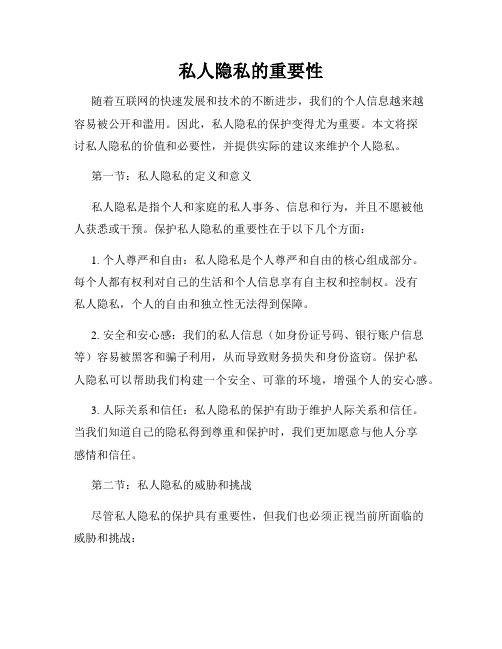
私人隐私的重要性随着互联网的快速发展和技术的不断进步,我们的个人信息越来越容易被公开和滥用。
因此,私人隐私的保护变得尤为重要。
本文将探讨私人隐私的价值和必要性,并提供实际的建议来维护个人隐私。
第一节:私人隐私的定义和意义私人隐私是指个人和家庭的私人事务、信息和行为,并且不愿被他人获悉或干预。
保护私人隐私的重要性在于以下几个方面:1. 个人尊严和自由:私人隐私是个人尊严和自由的核心组成部分。
每个人都有权利对自己的生活和个人信息享有自主权和控制权。
没有私人隐私,个人的自由和独立性无法得到保障。
2. 安全和安心感:我们的私人信息(如身份证号码、银行账户信息等)容易被黑客和骗子利用,从而导致财务损失和身份盗窃。
保护私人隐私可以帮助我们构建一个安全、可靠的环境,增强个人的安心感。
3. 人际关系和信任:私人隐私的保护有助于维护人际关系和信任。
当我们知道自己的隐私得到尊重和保护时,我们更加愿意与他人分享感情和信任。
第二节:私人隐私的威胁和挑战尽管私人隐私的保护具有重要性,但我们也必须正视当前所面临的威胁和挑战:1. 社交媒体和信息泄露:越来越多的人通过社交媒体共享他们的个人生活和信息。
然而,这种公开也使他们的私人信息容易暴露给潜在的风险。
2. 大数据和个人信息的滥用:大数据时代,个人信息被广泛收集和分析。
这些数据可能被用于商业推销、个人评估乃至对用户行为的操纵。
3. 政府监控和侵犯:一些政府机构在反恐和犯罪调查等方面可能使用监控技术来侵犯个人隐私权。
第三节:维护私人隐私的建议为了保护私人隐私,我们可以采取以下措施:1. 加强个人信息保护意识:了解个人信息的价值和风险,谨慎处理个人信息,不轻易泄露私密信息。
2. 使用强密码和多重验证:对于个人账户和数据,使用强密码,并开启多重验证功能,以提高信息安全。
3. 谨慎对待社交媒体和应用程序:仔细审查隐私设置,并限制个人信息的公开范围。
4. 定期更新和备份数据:定期更新设备和软件,及时备份个人数据,以防止数据丢失和被黑客攻击。
保护隐私的重要性及意义
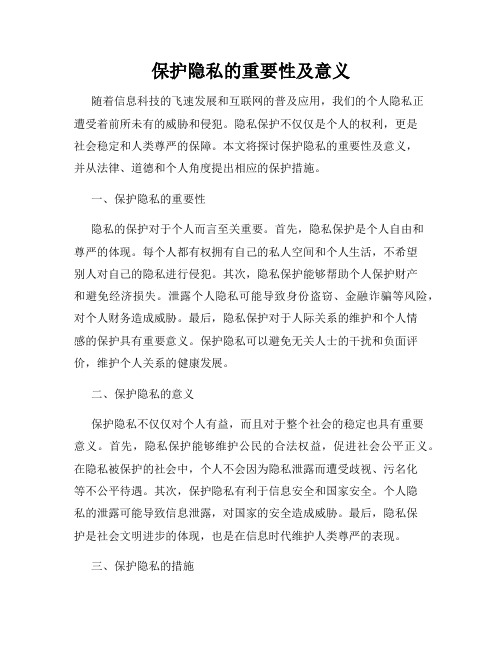
保护隐私的重要性及意义随着信息科技的飞速发展和互联网的普及应用,我们的个人隐私正遭受着前所未有的威胁和侵犯。
隐私保护不仅仅是个人的权利,更是社会稳定和人类尊严的保障。
本文将探讨保护隐私的重要性及意义,并从法律、道德和个人角度提出相应的保护措施。
一、保护隐私的重要性隐私的保护对于个人而言至关重要。
首先,隐私保护是个人自由和尊严的体现。
每个人都有权拥有自己的私人空间和个人生活,不希望别人对自己的隐私进行侵犯。
其次,隐私保护能够帮助个人保护财产和避免经济损失。
泄露个人隐私可能导致身份盗窃、金融诈骗等风险,对个人财务造成威胁。
最后,隐私保护对于人际关系的维护和个人情感的保护具有重要意义。
保护隐私可以避免无关人士的干扰和负面评价,维护个人关系的健康发展。
二、保护隐私的意义保护隐私不仅仅对个人有益,而且对于整个社会的稳定也具有重要意义。
首先,隐私保护能够维护公民的合法权益,促进社会公平正义。
在隐私被保护的社会中,个人不会因为隐私泄露而遭受歧视、污名化等不公平待遇。
其次,保护隐私有利于信息安全和国家安全。
个人隐私的泄露可能导致信息泄露,对国家的安全造成威胁。
最后,隐私保护是社会文明进步的体现,也是在信息时代维护人类尊严的表现。
三、保护隐私的措施保护隐私需要采取多种措施,包括法律、技术和个人自我保护等。
首先,国家应加强相关法律的制定和执行,加大对隐私侵犯的打击力度。
尤其是针对个人敏感信息的保护,必须加强个人信息保护法律的完善和落地。
其次,科技公司和互联网平台应加强用户个人信息的保护,提高信息安全水平。
采取隐私保护技术手段,避免个人信息被滥用和泄露。
最后,个人应自我保护,加强对个人隐私的意识和注意。
不随意透露个人敏感信息,合理设置个人隐私设置,避免个人信息被滥用和泄露。
结论保护隐私的重要性和意义不容忽视。
保护隐私是维护个人尊严、促进社会公平正义和信息安全的重要保障。
法律、技术和个人自我保护是实施隐私保护的关键措施。
个人隐私保护的重要性
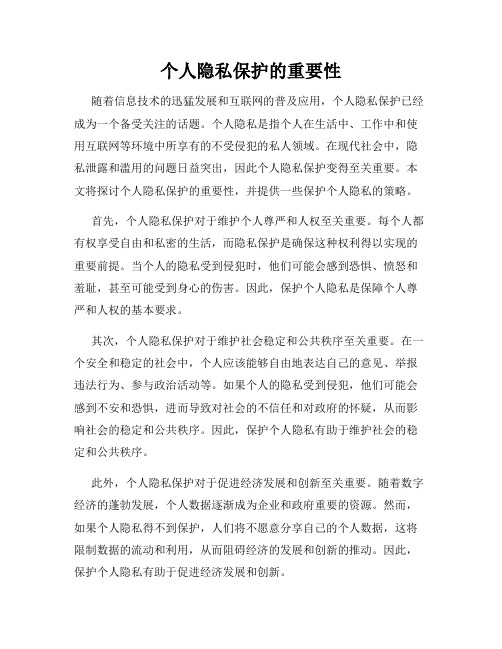
个人隐私保护的重要性随着信息技术的迅猛发展和互联网的普及应用,个人隐私保护已经成为一个备受关注的话题。
个人隐私是指个人在生活中、工作中和使用互联网等环境中所享有的不受侵犯的私人领域。
在现代社会中,隐私泄露和滥用的问题日益突出,因此个人隐私保护变得至关重要。
本文将探讨个人隐私保护的重要性,并提供一些保护个人隐私的策略。
首先,个人隐私保护对于维护个人尊严和人权至关重要。
每个人都有权享受自由和私密的生活,而隐私保护是确保这种权利得以实现的重要前提。
当个人的隐私受到侵犯时,他们可能会感到恐惧、愤怒和羞耻,甚至可能受到身心的伤害。
因此,保护个人隐私是保障个人尊严和人权的基本要求。
其次,个人隐私保护对于维护社会稳定和公共秩序至关重要。
在一个安全和稳定的社会中,个人应该能够自由地表达自己的意见、举报违法行为、参与政治活动等。
如果个人的隐私受到侵犯,他们可能会感到不安和恐惧,进而导致对社会的不信任和对政府的怀疑,从而影响社会的稳定和公共秩序。
因此,保护个人隐私有助于维护社会的稳定和公共秩序。
此外,个人隐私保护对于促进经济发展和创新至关重要。
随着数字经济的蓬勃发展,个人数据逐渐成为企业和政府重要的资源。
然而,如果个人隐私得不到保护,人们将不愿意分享自己的个人数据,这将限制数据的流动和利用,从而阻碍经济的发展和创新的推动。
因此,保护个人隐私有助于促进经济发展和创新。
为了保护个人隐私,个人和组织可以采取一些措施。
首先,个人应该增强隐私意识,了解个人隐私的含义和保护方法。
其次,个人应该注意个人信息的收集和使用,避免不必要的个人信息泄露。
此外,个人还可以使用安全的密码和加密技术,加强个人信息的保护。
同时,组织和政府也应加强相关法律法规的制定和执行,建立健全的个人隐私保护机制。
总结起来,个人隐私保护的重要性不言而喻。
个人隐私保护不仅是维护个人尊严和人权的基本要求,也是维护社会稳定和公共秩序的必要条件,同时还有助于促进经济发展和创新的推动。
个人隐私保护的重要性演讲稿
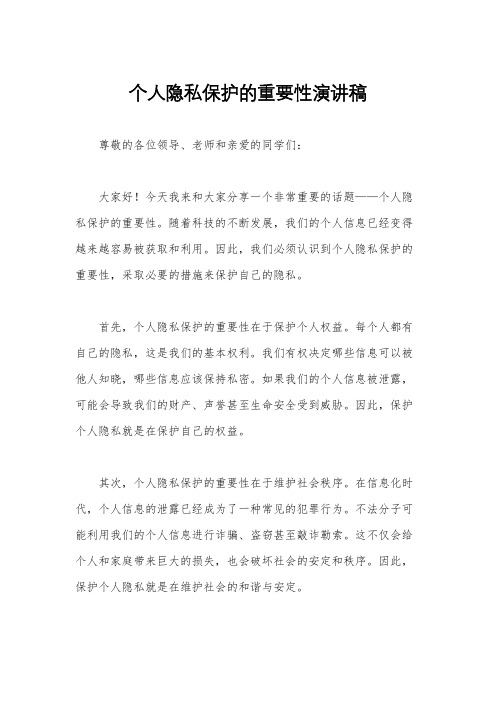
个人隐私保护的重要性演讲稿尊敬的各位领导、老师和亲爱的同学们:大家好!今天我来和大家分享一个非常重要的话题——个人隐私保护的重要性。
随着科技的不断发展,我们的个人信息已经变得越来越容易被获取和利用。
因此,我们必须认识到个人隐私保护的重要性,采取必要的措施来保护自己的隐私。
首先,个人隐私保护的重要性在于保护个人权益。
每个人都有自己的隐私,这是我们的基本权利。
我们有权决定哪些信息可以被他人知晓,哪些信息应该保持私密。
如果我们的个人信息被泄露,可能会导致我们的财产、声誉甚至生命安全受到威胁。
因此,保护个人隐私就是在保护自己的权益。
其次,个人隐私保护的重要性在于维护社会秩序。
在信息化时代,个人信息的泄露已经成为了一种常见的犯罪行为。
不法分子可能利用我们的个人信息进行诈骗、盗窃甚至敲诈勒索。
这不仅会给个人和家庭带来巨大的损失,也会破坏社会的安定和秩序。
因此,保护个人隐私就是在维护社会的和谐与安定。
最后,个人隐私保护的重要性在于促进科技的健康发展。
科技的进步给我们的生活带来了诸多便利,但同时也带来了一些隐患。
如果我们不能有效地保护个人隐私,就会给科技的发展带来阻碍。
因为人们会因为担心个人信息的泄露而不敢使用一些新的科技产品和服务,这将阻碍科技的创新和应用。
因此,我们每个人都应该重视个人隐私保护的重要性。
我们可以通过加强个人信息安全意识,加强个人信息保护技能,遵守相关法律法规,合理使用个人信息等途径来保护自己的隐私。
同时,我们也应该支持相关部门和机构加强对个人信息的保护,共同营造一个安全、和谐的网络环境。
最后,让我们共同努力,保护好自己的个人隐私,让我们的社会更加美好!谢谢大家!。
保护个人隐私的重要性及隐私保护措施详解
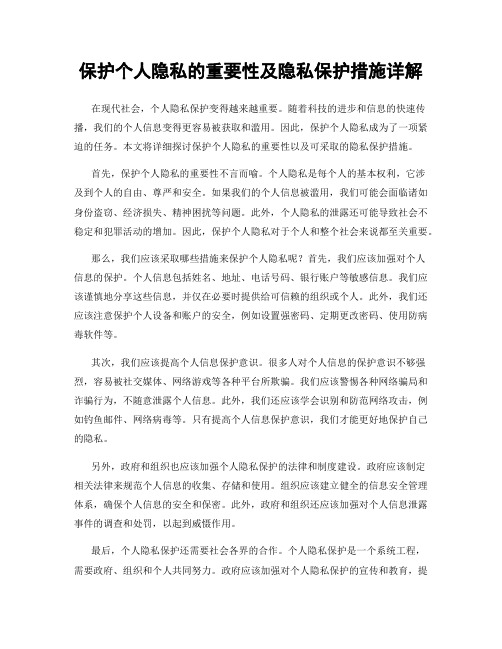
保护个人隐私的重要性及隐私保护措施详解在现代社会,个人隐私保护变得越来越重要。
随着科技的进步和信息的快速传播,我们的个人信息变得更容易被获取和滥用。
因此,保护个人隐私成为了一项紧迫的任务。
本文将详细探讨保护个人隐私的重要性以及可采取的隐私保护措施。
首先,保护个人隐私的重要性不言而喻。
个人隐私是每个人的基本权利,它涉及到个人的自由、尊严和安全。
如果我们的个人信息被滥用,我们可能会面临诸如身份盗窃、经济损失、精神困扰等问题。
此外,个人隐私的泄露还可能导致社会不稳定和犯罪活动的增加。
因此,保护个人隐私对于个人和整个社会来说都至关重要。
那么,我们应该采取哪些措施来保护个人隐私呢?首先,我们应该加强对个人信息的保护。
个人信息包括姓名、地址、电话号码、银行账户等敏感信息。
我们应该谨慎地分享这些信息,并仅在必要时提供给可信赖的组织或个人。
此外,我们还应该注意保护个人设备和账户的安全,例如设置强密码、定期更改密码、使用防病毒软件等。
其次,我们应该提高个人信息保护意识。
很多人对个人信息的保护意识不够强烈,容易被社交媒体、网络游戏等各种平台所欺骗。
我们应该警惕各种网络骗局和诈骗行为,不随意泄露个人信息。
此外,我们还应该学会识别和防范网络攻击,例如钓鱼邮件、网络病毒等。
只有提高个人信息保护意识,我们才能更好地保护自己的隐私。
另外,政府和组织也应该加强个人隐私保护的法律和制度建设。
政府应该制定相关法律来规范个人信息的收集、存储和使用。
组织应该建立健全的信息安全管理体系,确保个人信息的安全和保密。
此外,政府和组织还应该加强对个人信息泄露事件的调查和处罚,以起到威慑作用。
最后,个人隐私保护还需要社会各界的合作。
个人隐私保护是一个系统工程,需要政府、组织和个人共同努力。
政府应该加强对个人隐私保护的宣传和教育,提高公众对个人隐私保护的认识和重视程度。
组织应该加强对员工的培训,提高员工对个人信息保护的意识。
个人应该积极参与到个人隐私保护中来,不仅保护自己的隐私,还应该帮助他人保护隐私。
你认为个人隐私权的重要性如何?

你认为个人隐私权的重要性如何?一、保护个人自由权利个人隐私权是保护个人自由权利的重要组成部分。
人具有独立的思想、意志和价值观念,有权利自由表达和传播自己的思想、信仰、价值观念等。
而个人的隐私对自由权利的实现至关重要。
比如,个人的家庭、财产、婚姻等信息都应该得到尊重和保护,而不应被滥用或公开,否则会对人的自由权利造成损害。
二、保护个人尊严权利个人隐私权还涉及到个人的尊严权利。
每个人都有尊严和荣誉,个人的隐私信息不应被随意侵犯和公开。
否则,不仅会受到精神伤害,还可能会受到财产损失和声誉损害等影响。
比如,个人的健康信息、经济状况、家庭情况等隐私信息都应得到严格保护,任何人都不能侵犯。
三、保护社会稳定和安全保护个人隐私权对于社会的稳定和安全也至关重要。
在信息化社会,隐私信息泄露、滥用等问题日益突出,不仅会对个人带来极大的损害,还会危及社会的稳定和安全。
比如,黑客攻击、病毒传播、网络诈骗等犯罪行为都与个人隐私信息泄露或滥用有关。
因此,保护个人隐私权不仅是社会稳定和安全的需要,也是法治社会的基本要求。
四、加强隐私保护措施为了更好地保护个人隐私权,需要加强隐私保护措施。
首先,需要推出更为完善的法律法规,规范个人隐私信息的采集、存储、使用和传输。
其次,需要引入更为先进的技术手段,加强隐私信息的加密和防护。
同时,需要加强公众教育,倡导个人隐私保护的意识与行动。
五、加强个人隐私意识教育个人隐私权的重要性不容忽视,需要社会各界的共同努力来加强个人隐私意识教育。
首先,需要提高公众的隐私保护意识,拒绝随意泄露个人隐私信息。
其次,需要加强隐私保护意识的教育,引导公众了解隐私泄露对个人的影响,提高个人保护隐私和信息安全的能力。
这样才能保护自己的个人隐私,维护自己的合法权益。
综上所述,个人隐私权的重要性是不言而喻的。
保护个人隐私,需要社会各界的共同努力,推出更为完善的法律法规,加强隐私保护措施,提高个人隐私意识等措施。
只有这样,才能更好地保护个人隐私和信息安全。
道德与法治知识点尊重他人的隐私

道德与法治知识点尊重他人的隐私道德与法治知识点:尊重他人的隐私随着信息技术的迅猛发展,我们的社会已经进入一个信息爆炸的时代。
从社交媒体到网络购物,从智能手机到数字支付,我们的个人信息正变得越来越容易被他人获取和使用。
在这个时代,尊重他人的隐私成为一项重要的道德和法治知识点。
本文将探讨为什么我们应该尊重他人的隐私,以及隐私权在法治中的地位。
一、隐私的重要性1. 个人尊严和自由:每个人都有权保护自己的个人信息和隐私。
尊重他人的隐私是尊重个体的尊严和自由,是人类社会伦理发展的重要标志。
2. 个人安全和信任:保护他人的隐私可以帮助维护个人的安全和信任。
如果我们不尊重他人的隐私,个人信息可能被滥用甚至导致身份盗窃、财产损失等问题,社会信任也将受到严重威胁。
3. 社会秩序和稳定:尊重他人的隐私有助于维护社会秩序和稳定。
没有隐私保护,会引发个人之间的猜疑、冲突和争议,进而破坏社会的和谐与稳定。
二、隐私在法治中的地位1. 法律保护:在现代社会,大多数国家和地区都有相应的法律法规来保护个人隐私权。
这些法律规定了个人信息的收集、使用和保护的法律责任和限制。
2. 个人信息保护法:越来越多的国家和地区出台了个人信息保护法,明确规定了个人信息的保护范围、处理原则和违法行为的追责标准。
3. 隐私权与公共利益的平衡:尽管隐私权是一项重要权利,但在一些特殊情况下,为了维护公共安全、推动刑事司法等目的,可能需要对隐私权进行限制。
这就需要在法律中明确规定隐私权与公共利益的平衡原则,确保尊重他人隐私的前提下,最大程度地保护社会公共利益。
三、保护他人隐私的行动1. 自律使用个人信息:作为个人,我们应该自律地使用他人的个人信息。
在使用社交媒体、互联网服务等时,谨慎选择分享个人信息,避免随意传播他人的私密信息。
2. 注意保密和安全:我们应该注意个人信息的保密和安全。
在使用电子设备时,妥善保管个人设备和帐号的密码,及时更新软件防护个人信息的安全。
个人隐私与信息安全

个人隐私与信息安全随着互联网和数字技术的快速发展,个人隐私和信息安全问题日益引起关注。
在这个数字时代,个人隐私的保护和信息安全的维护变得尤为重要。
本文将就这一话题进行探讨,重点分析个人隐私和信息安全的定义、重要性以及保护措施。
一、个人隐私的定义和重要性个人隐私是指个人以自愿的形式授予的保护其个人信息的权利。
这些个人信息包括但不限于姓名、住址、电话号码、银行账户等。
个人隐私的保护对个人的尊严、自由和安全至关重要。
个人隐私的重要性主要体现在以下几个方面:1. 尊重个人权利:保护个人隐私是尊重个人权利的基础。
每个人都有权决定是否分享自己的个人信息,以及与谁分享。
2. 防止身份盗窃:个人隐私的泄露可能导致身份盗窃和欺诈活动。
黑客和骗子可能使用个人信息进行非法活动,给个人带来财务损失和心理困扰。
3. 维护社交关系:保护个人隐私有助于维持个人和社交关系之间的信任。
如果个人信息被滥用或泄露,可能会损害个人与朋友、家人和同事之间的关系。
二、信息安全的定义和重要性信息安全是指在数字时代保护信息系统和信息资产免受未经授权的访问、使用、披露、破坏、修改或干扰的过程。
信息安全严重影响个人、组织和国家的利益。
信息安全的重要性主要体现在以下几个方面:1. 经济安全:信息安全对于保护财务、商业和经济利益至关重要。
未经授权的访问和数据泄露可能导致金融损失和商业间谍活动。
2. 国家安全:信息安全对于国家的安全和国防力量有着重要意义。
黑客和恶意分子可能试图攻击国家的信息基础设施,威胁国家的安全。
3. 个人隐私:信息安全直接关系到个人隐私的保护。
个人的个人信息和通信需要得到保护,以避免个人信息被滥用或泄露。
三、个人隐私和信息安全的保护措施为了保护个人隐私和信息安全,个人、组织和国家可以采取以下措施:1. 强密码:使用复杂、独特且不易猜测的密码来保护个人账户和设备的安全。
2. 多因素认证:使用多种身份验证方式,如指纹、面部识别等,以增加账户和设备的安全性。
个人隐私保护的重要性
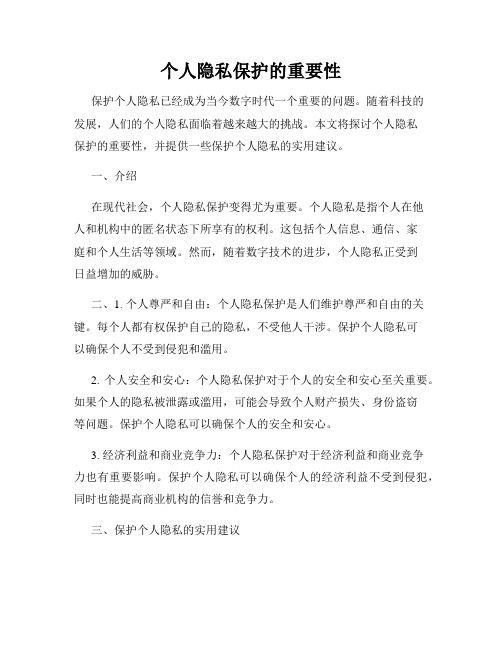
个人隐私保护的重要性保护个人隐私已经成为当今数字时代一个重要的问题。
随着科技的发展,人们的个人隐私面临着越来越大的挑战。
本文将探讨个人隐私保护的重要性,并提供一些保护个人隐私的实用建议。
一、介绍在现代社会,个人隐私保护变得尤为重要。
个人隐私是指个人在他人和机构中的匿名状态下所享有的权利。
这包括个人信息、通信、家庭和个人生活等领域。
然而,随着数字技术的进步,个人隐私正受到日益增加的威胁。
二、1. 个人尊严和自由:个人隐私保护是人们维护尊严和自由的关键。
每个人都有权保护自己的隐私,不受他人干涉。
保护个人隐私可以确保个人不受到侵犯和滥用。
2. 个人安全和安心:个人隐私保护对于个人的安全和安心至关重要。
如果个人的隐私被泄露或滥用,可能会导致个人财产损失、身份盗窃等问题。
保护个人隐私可以确保个人的安全和安心。
3. 经济利益和商业竞争力:个人隐私保护对于经济利益和商业竞争力也有重要影响。
保护个人隐私可以确保个人的经济利益不受到侵犯,同时也能提高商业机构的信誉和竞争力。
三、保护个人隐私的实用建议1. 加强个人信息保护意识:每个人都应意识到保护个人隐私的重要性,并对个人信息的安全性有所了解。
这包括不随意公开个人敏感信息,定期更改密码等。
2. 定期审查隐私政策:在使用各种应用和平台时,应仔细审查隐私政策,并了解其数据收集和使用方式。
避免使用不能提供个人数据保护的服务。
3. 使用安全的网络连接和设备:在网络上浏览或进行在线交易时,应使用安全的网络连接,并确保自己的设备有最新的安全补丁和防病毒软件。
4. 尊重他人隐私:保护他人的隐私与保护自己的隐私一样重要。
避免无谓地收集、传播或滥用他人的个人信息。
5. 合理授权个人数据的使用:在向应用或网站提供个人数据时,应谨慎授权,仅提供必要的信息,并了解数据的使用目的。
6. 加强个人隐私保护的法规和政策:政府和相关机构应加强个人隐私保护的法规和政策,以保护公民的隐私权益。
四、结论个人隐私保护对于维护个人尊严和自由、个人安全和安心、经济利益和商业竞争力都非常重要。
隐私设置的重要性与技巧(十)
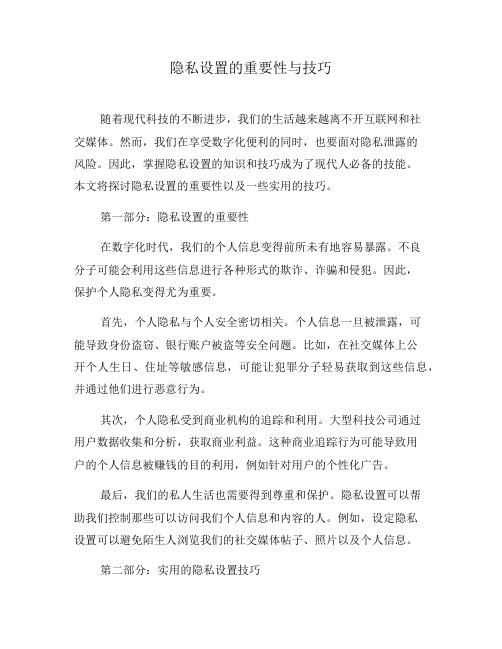
隐私设置的重要性与技巧随着现代科技的不断进步,我们的生活越来越离不开互联网和社交媒体。
然而,我们在享受数字化便利的同时,也要面对隐私泄露的风险。
因此,掌握隐私设置的知识和技巧成为了现代人必备的技能。
本文将探讨隐私设置的重要性以及一些实用的技巧。
第一部分:隐私设置的重要性在数字化时代,我们的个人信息变得前所未有地容易暴露。
不良分子可能会利用这些信息进行各种形式的欺诈、诈骗和侵犯。
因此,保护个人隐私变得尤为重要。
首先,个人隐私与个人安全密切相关。
个人信息一旦被泄露,可能导致身份盗窃、银行账户被盗等安全问题。
比如,在社交媒体上公开个人生日、住址等敏感信息,可能让犯罪分子轻易获取到这些信息,并通过他们进行恶意行为。
其次,个人隐私受到商业机构的追踪和利用。
大型科技公司通过用户数据收集和分析,获取商业利益。
这种商业追踪行为可能导致用户的个人信息被赚钱的目的利用,例如针对用户的个性化广告。
最后,我们的私人生活也需要得到尊重和保护。
隐私设置可以帮助我们控制那些可以访问我们个人信息和内容的人。
例如,设定隐私设置可以避免陌生人浏览我们的社交媒体帖子、照片以及个人信息。
第二部分:实用的隐私设置技巧1.社交媒体隐私设置社交媒体是我们在线上社交和分享的主要平台,因此,保护个人隐私的首要任务是设定良好的隐私设置。
首先,应该确保只和真实的朋友、家人分享自己的个人信息和活动。
其次,定期检查和更新隐私设置,确保只有授权人可以查看自己的个人信息。
最后,不要轻易接受陌生人的好友请求,避免信息泄露和陷阱。
2.强密码和多因素身份验证密码是保护个人信息的第一道防线。
设置一个强密码,可以提高账户的安全性。
强密码包括大小写字母、数字和特殊字符的组合,且长度较长。
此外,引入多因素身份验证是保护个人信息的一种有效方式。
多因素身份验证结合了密码和其他形式的身份验证,例如短信验证码、指纹、面部识别等。
3.应用程序权限管理当我们下载和使用应用程序时,经常会被要求授予各种权限,例如访问相册、麦克风、位置等。
隐私设置的重要性与技巧(五)
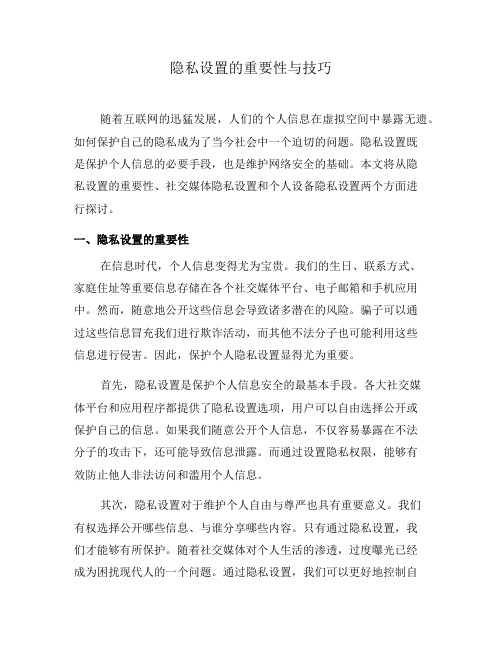
隐私设置的重要性与技巧随着互联网的迅猛发展,人们的个人信息在虚拟空间中暴露无遗。
如何保护自己的隐私成为了当今社会中一个迫切的问题。
隐私设置既是保护个人信息的必要手段,也是维护网络安全的基础。
本文将从隐私设置的重要性、社交媒体隐私设置和个人设备隐私设置两个方面进行探讨。
一、隐私设置的重要性在信息时代,个人信息变得尤为宝贵。
我们的生日、联系方式、家庭住址等重要信息存储在各个社交媒体平台、电子邮箱和手机应用中。
然而,随意地公开这些信息会导致诸多潜在的风险。
骗子可以通过这些信息冒充我们进行欺诈活动,而其他不法分子也可能利用这些信息进行侵害。
因此,保护个人隐私设置显得尤为重要。
首先,隐私设置是保护个人信息安全的最基本手段。
各大社交媒体平台和应用程序都提供了隐私设置选项,用户可以自由选择公开或保护自己的信息。
如果我们随意公开个人信息,不仅容易暴露在不法分子的攻击下,还可能导致信息泄露。
而通过设置隐私权限,能够有效防止他人非法访问和滥用个人信息。
其次,隐私设置对于维护个人自由与尊严也具有重要意义。
我们有权选择公开哪些信息、与谁分享哪些内容。
只有通过隐私设置,我们才能够有所保护。
随着社交媒体对个人生活的渗透,过度曝光已经成为困扰现代人的一个问题。
通过隐私设置,我们可以更好地控制自己的信息流动,保持个人空间的独立性,避免成为他人的话题和讨论对象。
二、社交媒体隐私设置技巧社交媒体已经成为现代社会交流的重要载体,掌握一些隐私设置的技巧对于保护个人信息至关重要。
首先,及时更新隐私设置。
很多人在注册社交媒体账号时,会默认选择公开所有信息。
然而,这是一个极不安全的做法。
我们应该定期检查和更新自己的隐私设置,及时调整可见性范围,以确保个人信息不能被轻易访问。
其次,谨慎地选择分享对象和发布内容。
社交媒体提供了分组功能,我们可以将不同的好友分为不同的组别,只向特定的人群分享特定内容。
这样做不仅能够控制信息流动,还能够避免某些敏感信息泄露。
- 1、下载文档前请自行甄别文档内容的完整性,平台不提供额外的编辑、内容补充、找答案等附加服务。
- 2、"仅部分预览"的文档,不可在线预览部分如存在完整性等问题,可反馈申请退款(可完整预览的文档不适用该条件!)。
- 3、如文档侵犯您的权益,请联系客服反馈,我们会尽快为您处理(人工客服工作时间:9:00-18:30)。
Why Does Privacy Matter?隐私为什么重要passed in 1986! While an update to the law-- spurred on by the General Petraeus scandal -- is in the works, it only aims to add some more protection to electronic communication like emails. This still does not shield our privacy from other, possibly nefarious, ways that our data can be collected and put to use. Some legislators would much rather not have legal restrictions that could, as Rep. Marsha Blackburn stated in an op-ed, "threaten the lifeblood of the Internet: data." Consider Rep. Blackburn's remarks during an April 2010 Congressional hearing: "[A]nd what happens when you follow the European privacy model and take information out of the information economy? ... Revenues fall, innovation stalls and you lose out to innovators who choose to work elsewhere."我们的隐私正面临前所未有的风险,但不幸的是,相关的法律制度却落后于创新的脚步。
的确,最近的一部主要隐私法《电子通信隐私法》还是在1986年通过的!虽然因为彼得雷乌斯将军的丑闻事件而触发了对该法律的更新,但这种更新也仅仅是对于例如邮件等电子通信予以更多的保护,仍然无法把我们的隐私与其他很可能违法的行为区别开来,我们的数据信息很可能会被非法搜集并使用。
玛莎·布莱克本作为代表本在一篇专栏当中说,一些立法者宁愿不要相关的法律限制,因为这会“威胁互联网的命脉:数据。
”听听布莱克本在2010年四月的一场国会听证会的发言:“如果我们效仿欧洲的隐私模式,把信息从信息经济当中抽离出来会发生什么情况呢?……国民经济衰落、创新发展停滞,而你会输给选择到别处工作的创新者们。
”Even though the practices of many companies such as Facebook are legal, there is something disconcerting about them. Privacy should have a deeper purpose than the one ascribed to it by those who treat it as a currency to be traded for innovation, which in many circumstances seems to actually mean corporate interests. To protect our privacy, we need a better understanding of its purpose and why it is valuable.即便是很多诸如Facebook等公司的行为是合法的,他们的做法还是有令人不满的地方。
隐私应该拥有更加深刻的目的,而不应只是像现在这样把它作为换取创新的货币,在很多情况下这似乎也就等同于公司利益。
要想保护隐私,我们需要对于隐私的目的以价值进行更为深入的了解。
That's where Georgetown University law professor Julie E. Cohen comes in. In a forthcoming article for the Harvard Law Review, she lays out a strong argument that addresses the titular concern " What Privacy Is For." Her approach is fresh, and as technology critic Evgeny Morozov rightly tweeted, she wrote "the best paper on privacy theory you'll get to read this year." (He was referring to 2012.)这就涉及到乔治城大学法律教授朱莉·科恩的研究领域了。
在《哈佛法律评论》期刊上即将发表的一篇论文中,她提出了关于“隐私是为了什么”这一话题的有力论点。
她的观点十分新颖,正如科技评论家耶夫根尼·莫洛佐夫微博上说的那样,朱莉·科恩写出了“今年在隐私理论方面最优秀的文章“(他指的是2012年)。
At bottom, Cohen's argument criticizes the dominant position held by theorists and legislators who treat privacy as just an instrument used to advance some other principle or value, such as liberty, inaccessibility, or control. Framed this way, privacy is relegated to one of many defenses we have from things like another person's prying eyes, or Facebook's recent attempts to ramp up its use of facial-recognition software and collect further data about us without our explicit consent. As long as the principle in question can be protected through some other method, or if privacy gets in the way of a different desirable goal like innovation, it is no longer useful and can be disregarded.科恩的观点本质上是对于当今理论家和立法者所持有的主要观进行批判,他们将隐私看作是发展如自由、不可存取性、或控制等原理或价值的工具。
在这一框架下,隐私就被降级为我们多种防卫的其中一种,比如防止他人的偷窥,比如防止Facebook最近在未经个人明确授权的情况下,试图提升其面部识别软件以此获取更多用户数据的行为。
只要是能通过其他途径来保护的原则,或是当隐私阻碍了其他像创新这样更有利可图的目标时,那么这些原则就显得不那么有用因而也会被漠视。
Cohen doesn't think we should treat privacy as a dispensable instrument. To the contrary, she argues privacy is irreducible to a "fixed condition or attribute (such as seclusion or control) whose boundaries can be crisply delineated by the application of deductive logic. Privacy is shorthand for breathing room to engage in the process of self-development."科恩并不认为我们应该将隐私视为是一种可有可无的工具。
反之,她主张隐私不能狭义地理解为“可以通过演绎逻辑被明确界定的一个固定条件或属性(例如隔离或控制)。
隐私其实是一种过程中的……一种自我发展过程中的喘息空间。
”What Cohen means is that since life and contexts are always changing, privacy cannot be reductively conceived as one specific type of thing. It is better understood as an important buffer that gives us space to develop an identity that is somewhat separate from the surveillance, judgment, and values of our society and culture. Privacy is crucial for helping us manage all of these pressures -- pressures that shape the type of person we are -- and for "creating spaces for play and the work of self-[development]." Cohen argues that this self-development allows us to discover what type of society we want and what we should do to get there, both factors that are key to living a fulfilled life. 科恩的意思是,生活和环境总是在变化的,所以隐私不能单纯地用一个具体的事物来定义。
